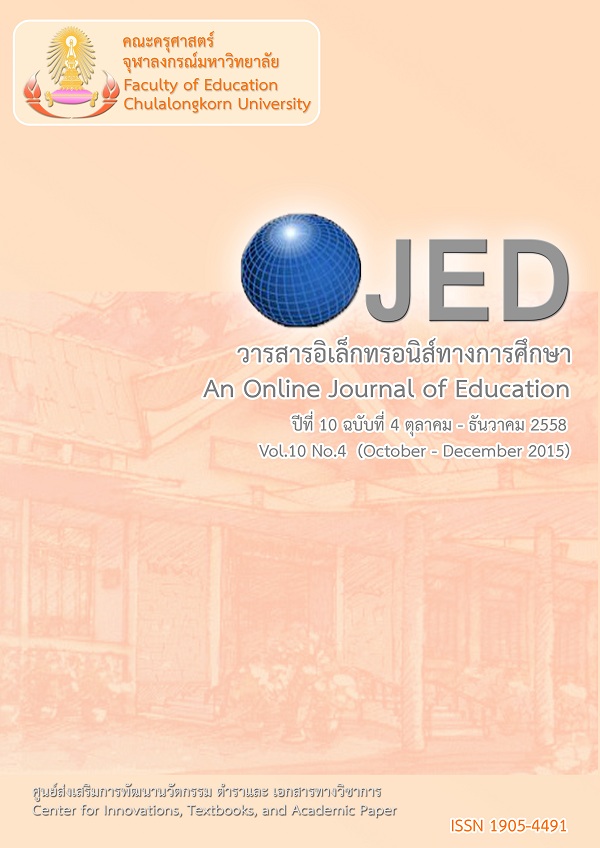การพัฒนาแบบวัดจิตอาสาสำหรับนักเรียนระดับชั้นมัธยมศึกษาตอนต้น โดยใช้แนวคิดทฤษฎีความสามารถในการให้เหตุผลเชิงจริยธรรมของโคลเบอร์ก
Keywords:
จิตอาสา, แบบวัดจิตอาสา, เหตุผลเชิงจริยธรรมของโคลเบอร์ก, VOLUNTEER MIND, VOLNTEER MIND SCALE, KOHLBERG’S COGNITIVE THEORYAbstract
การพัฒนาแบบวัดจิตอาสาสำหรับนักเรียนระดับชั้นมัธยมศึกษาตอนต้นโดยใช้แนวคิดทฤษฎีความสามารถในการให้เหตุผลเชิงจริยธรรมของโคลเบอร์ก เป็นงานวิจัยเชิงบรรยาย มีวัตถุประสงค์เพื่อพัฒนาแบบวัดจิตอาสาสำหรับนักเรียนระดับชั้นมัธยมศึกษาตอนต้นโดยใช้แนวคิดทฤษฎีความสามารถในการให้เหตุผลเชิงจริยธรรมของโคลเบอร์ก แบบวัดที่พัฒนาขึ้นเป็นแบบสอบถามประสบการณ์ด้านจิตอาสาของนักเรียน ซึ่งแบ่งองค์ประกอบ จิตอาสาออกเป็น 3 ด้าน คือ การช่วยเหลือผู้อื่น การเสียสละต่อสังคม และความมุ่งมั่นพัฒนา หลังจากพัฒนาแบบวัดจิตอาสาสำหรับนักเรียนระดับชั้นมัธยมศึกษาตอนต้นโดยใช้แนวคิดทฤษฎีความสามารถในการให้เหตุผลเชิงจริยธรรมของโคลเบอร์ก ผู้วิจัยได้ทดลองใช้แบบวัดจิตอาสากับนักเรียนระดับมัธยมศึกษาตอนต้น จำนวน 49 คน ผลการวิเคราะห์คุณภาพ แบบวัด 1) แบบวัดจิตอาสาที่พัฒนาขึ้นมีค่าดัชนีความสอดคล้องระหว่างข้อคำถามกับวัตถุประสงค์ที่ต้องการวัด (IOC) มีค่าอยู่ระหว่าง 0.50 – 1.00 2) การตรวจสอบความเที่ยงด้วยวิธีการประมาณค่าสัมประสิทธิ์แอลฟาของครอนบาค พบว่า มีค่าความเที่ยงทั้งฉบับเท่ากับ 0.901 ซึ่งอยู่ในเกณฑ์สูง โดยมีค่าความเที่ยงด้านการช่วยเหลือผู้อื่น การเสียสละต่อสังคม และความมุ่งมั่นพัฒนา เท่ากับ 0.695, 0.838 และ 0.775 ตามลำดับ 3) การตรวจสอบความตรงเชิงโครงสร้างด้วยวิธีการวิเคราะห์องค์ประกอบเชิงยืนยัน พบว่า โมเดลจิตอาสามีความสอดคล้องกับข้อมูลเชิงประจักษ์ ( 2= 0.104, df=1, p= 0.747, GFI=0.998, AGFI=0.991, RMR=0.029, RMSEA=0.000)
A study on the development of a volunteer mind scale for lower secondary school students based on Kohlberg’s cognitive theory of moral reasoning ability is a descriptive research with following purposes to development of a volunteer mind scale for lower secondary school students based on Kohlberg’s cognitive theory of moral reasoning ability. The volunteer mind scale is the questionnaires volunteer experiences of students. Each element Volunteers into three factor: helping others, social sacrifice and a commitment to development. The sample consisted of 48 lower secondary school students. The research findings were as follow: 1) the values of the item-level content validity index and scale-level content validity index were between 50 – 1.00. 2) the reliability as the overall and each subscale was 0.901. The reliability of helping others, social sacrifice and a commitment to development of equals 0.695, 0.838 and 0.775 respectively. 3) the result showed the confirmatory factor analysis with reasonable criteria of evaluating the fitness of measurement model. All model fit statistics fell within acceptable range, which indicated that the measurement model fit was reasonable ( 2= 0.104, df=1, p= 0.747, GFI=0.998, AGFI=0.991, RMR=0.029, RMSEA=0.000)




